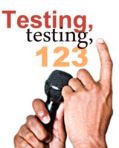ChangingStory1.5-Testing

I could be excused for thinking I was somehow growing dumber with each passing year, and I remain grateful for that high school guidance counsellor who headed off deeper discouragement by convincing me that I was not, as he phrased it, “college material.” I most certainly was not, and perhaps most persuasively because I then, much more than now, believed that the purpose of testing might probably be to assess my level of retained knowledge, whatever that means. The Muse insists that she can pass most any test, and always could, because she somehow figured out that testing could never say much about who she is or what she knows, but might instead assess how skillfully she navigates that alien environment, one almost completely unlike the real, lived world, where right and wrong answers exist, like some prehistoric bug suspended in amber. Maybe she’s just a good guesser, but I don’t think so.
Quizzes seem increasingly popular, a form of entertainment in social media. What Type Of Marsupial Are You?, the headline screams from my Facebook home page, and I feel compelled to click, as if five purposefully snarky questions might provide that key insight into who and what I’m really made of. Another invites me to ‘test’ my knowledge of some subject I’d never previously even heard of. The Muse, of course, could submit to that examination and be declared a grand master. I click past.
Listening to Wait, Wait, Don’t Tell Me, I eavesdrop in on the most ridiculous quizzes, where the quizzed clearly guess, then get lauded as genius when choosing the pre-determined ‘right’ answer from three equally absurd alternatives. I appreciated what was happening there rather more than I appreciated the same silly pattern when I sat for a French exam in seventh grade.
My daughter’s partner was recruited for a job he was very well suited for. His excitement lasted until the prospective employer handed him an exam to take. He looked over the questions before telling the employer that his exam covered areas he had no experience with, and which the technology he would be working with wouldn’t require. Since he might pass this exam if he agreed to take it, he passed it back to the employer instead, explaining that it would be unethical to pretend he had knowledge he did not possess.
I believe that we give too much credence to the tests in our lives. Little can be reasonably reduced into that etherial world where right and wrong make much sense at all. Some test takers seem to be able to sense what the test maker had in mind, and read that mind knowing that the answer, right or wrong, says nothing about the test taker’s knowledge or identity, but about their ability to play a subtler game, one we dare not even mention, one more critical to the appearance of success than knowledge or identity seemed to have back when I was cringing in that sound-proofed cubicle back in Junior High French class.
I do not test well, thank heavens. I hold my breath when asked to retake the written exam to renew my driver’s license because I can never exactly remember whether a flashlight beam can normally be seen from a distance of a hundred feet, or more, or less, but I could possibly make a cogent argument around a definite ‘depends’ on that and most any other subject. I do not test well because I don’t know much, though I might know more than I know that I know. I also perform poorly in other contrived competitions like card games and board games, contexts where the big winners seem to be playing an altogether other game than the one the rules describe. I can almost always reliably win by choosing not to compete. So much the loss for anyone limiting their selection to only those who perform well on the exam.
©2014 by David A. Schmaltz - all rights reserved


